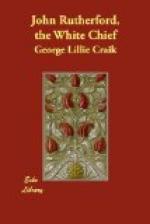“The chiefs’ wives in New Zealand are never jealous of each other, but live together in great harmony; the only distinction among them being that the oldest is always considered the head wife. No other ceremony takes place on the occasion of a marriage, except what I have mentioned. Any child born of a slave woman, though the father should be a chief, is considered a slave, like its mother.
“A woman found guilty of adultery is immediately put to death. Many of the chiefs take wives from among their slaves; but any one else that marries a slave woman may be robbed with impunity; whereas he who marries a woman belonging to a chief’s family is secure from being plundered, as the natives dare not steal from any person of that rank.
“With regard to stealing from others, the custom is that if any person has stolen anything, and kept it concealed for three days, it then becomes his own property, and the only way for the injured party to obtain satisfaction is to rob the thief in return. If the theft, however, be detected within three days, the thief has to return the article stolen; but, even in that case, he goes unpunished. The chiefs, also, although secure from the depredations of their inferiors, plunder one another, and this often occasions a war among them.”
By music in this passage, Rutherford evidently means instrumental music, which, it would appear, was not known in the parts of New Zealand where he resided. Other authorities, however, speak of different wind-instruments, similar to our fifes or flutes, which are elsewhere in common use.
One which is frequently to be met with at the Bay of Islands consists, according to Savage, of a tube six or seven inches long, open at both extremities, and having three holes on one side, and one on the other. Another is formed of two pieces of wood bound together, so as to make a tube inflated at the middle, at which place there is a single hole. It is blown into at one extremity, while the other is stopped and opened, to produce different modifications of the sound.
Nicholas once saw an instrument like a flute, made of bone, very ingeniously carved, hanging at the breast of one of the natives; and when he asked what bone it was formed from, the possessor immediately told him that it was the bone of a man. It was a larger bone than any of the native animals could have supplied.
Vocal music is one of the favourite amusements of the New Zealanders. Destitute as they are of the art of writing, they have, nevertheless, their song poetry, part of which is traditionary, and part the produce of such passing events as strongly excite their feelings, and prompt their fancy to this only work of composition of which they have any knowledge.
Certain individuals among them are distinguished for their success in these effusions; but the people inhabiting the vicinity of the East Cape seem generally to enjoy the highest reputation for this species of talent. These tribes, indeed, are described as in many other respects decidedly superior to the rest of their countrymen. It is among them that all the arts known in New Zealand flourish in the greatest perfection; as, for example, the working of mats, and the making and polishing of the different instruments used in war.




